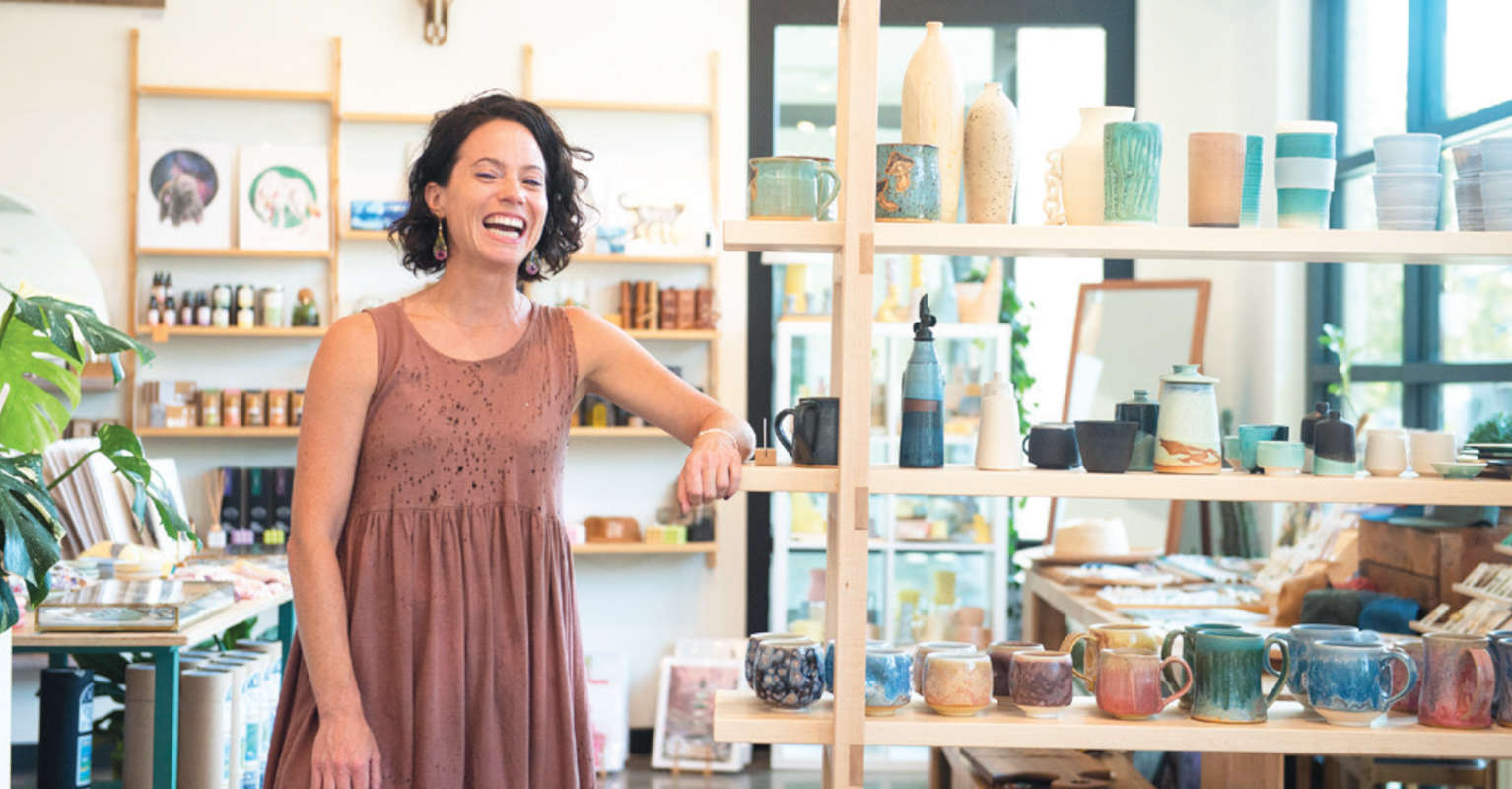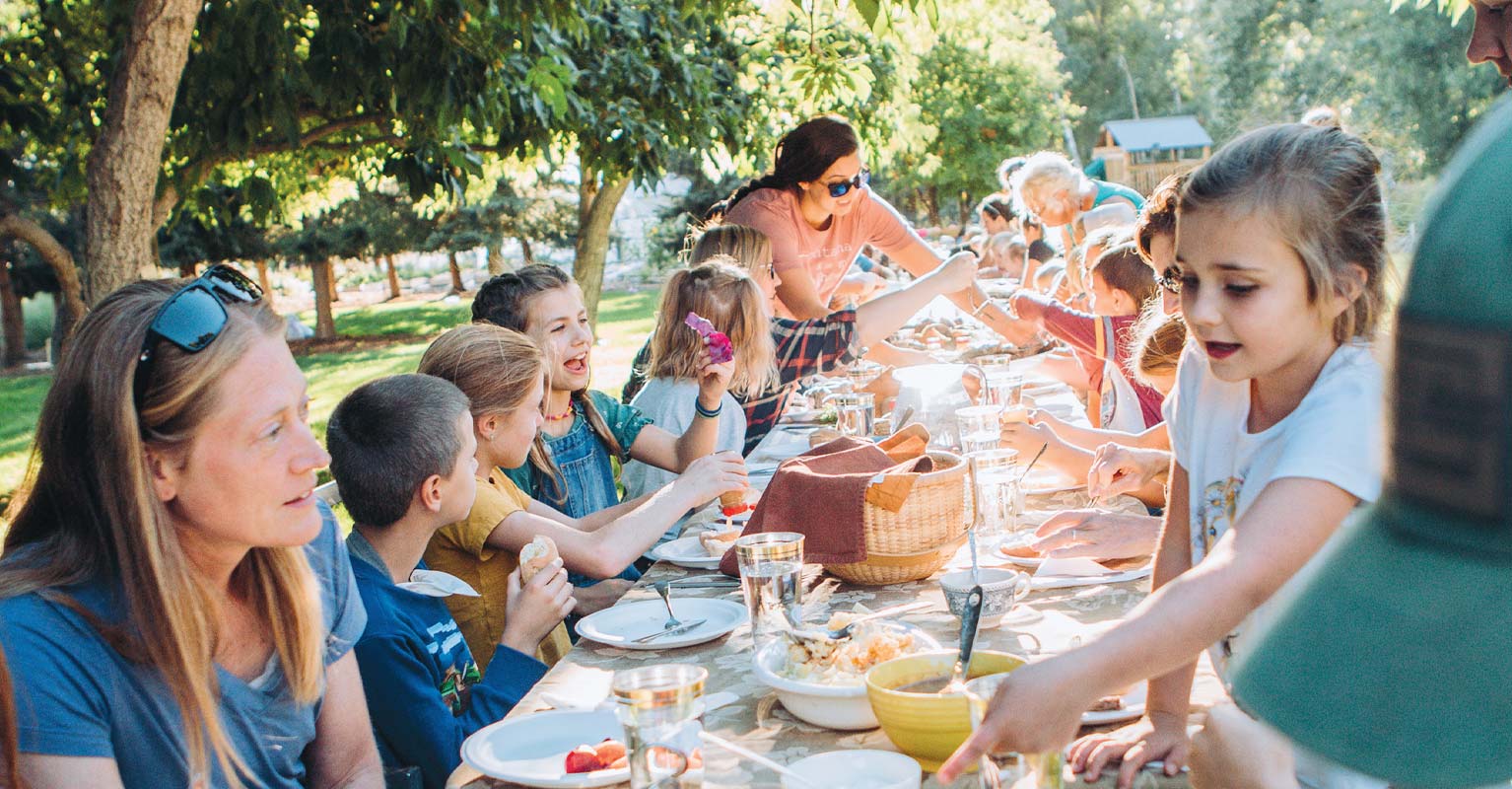Laura Fisher (center) and Montana seamstresses Twila Reovan, Leslie Padgett, and Elsa Austin develop small-batch clothing designs made with dead-stock fabric from their downtown Bozeman studio
Creating Thoughtful, Quality Clothes
The way we create and consume clothing is slowly changing as we tune in to the impact our choices have on our environment and communities. More and more, fashion designers and customers alike are wielding the power of spending to influence what they value most.
Change is hard. It requires gumption and grit, and it is often fueled by a spark of hope—hope for something different, something better. And for these three Montana clothing makers, hope for something better is exactly what’s driven them to create products that challenge the way we think about consumerism and waste, social equity and community.
RevivALL Clothing
Laura Fisher, owner of the downtown Bozeman clothing line RevivALL, is brimming with color, texture, and charm. Chock-full of vibrant fabrics, spools of thread, and sewing machines, her studio is a buzz of music and laughter. Fisher studied fashion design in New York City and while working in clothing factories, she was shocked by the dumpsters of discarded fabric. Historically, designers have been very protective of their patented patterns and would simply throw away fabric that was no longer in use. After witnessing this excessive waste, Fisher knew she could not move through a career designing with new fabrics. Instead, she dedicated her career to using thrifted, upcycled, and retired fabrics.
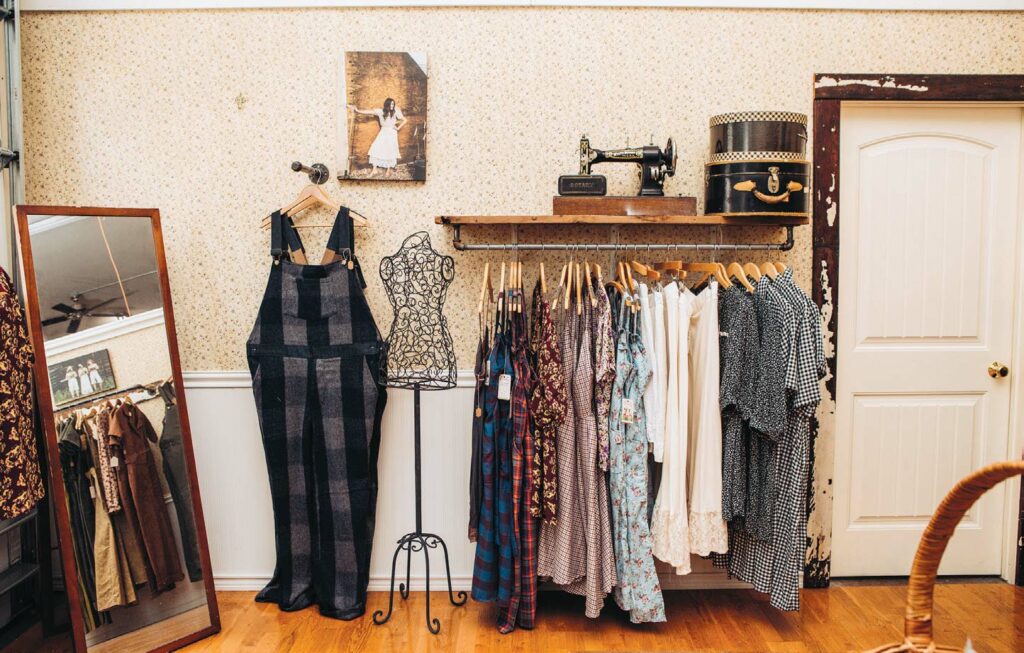
Not only is Fisher creating a conversation around waste and the culture of disposable clothing, she’s also bringing meaning to the garments we wear.
Fisher’s career has taken many turns but has centered around reducing waste, creating quality, and giving meaning to the pieces she makes. Before coming to Montana, she owned a clothing resale shop in Oregon and started the Eugene Fashion Week, creating conversation around the efforts of slow fashion, developing a community of independent designers, and establishing an outlet to showcase their work. She launched RevivALL, a clothing line of small-batch folk-inspired, pastoral-chic styles, in Oregon in 2008 and brought the business to Bozeman in 2016. Everything she creates is made of retired—or dead-stock—fabrics and is a curated collection of patterns for each season. Fisher works with seamstresses in Montana and Oregon and cuts patterns from her Bozeman studio.
Not only is Fisher creating a conversation around waste and the culture of disposable clothing, she’s also bringing meaning to the garments we wear. “Our clothing becomes a piece of people’s lives,” she says. She promotes quality over quantity, likening her process to the attention to detail that was once applied to everyday items such as hand-painted cookware and dust pans; so much care was put into the few things a person owned. RevivALL is about creating clothing that weaves a story between the maker and the wearer.
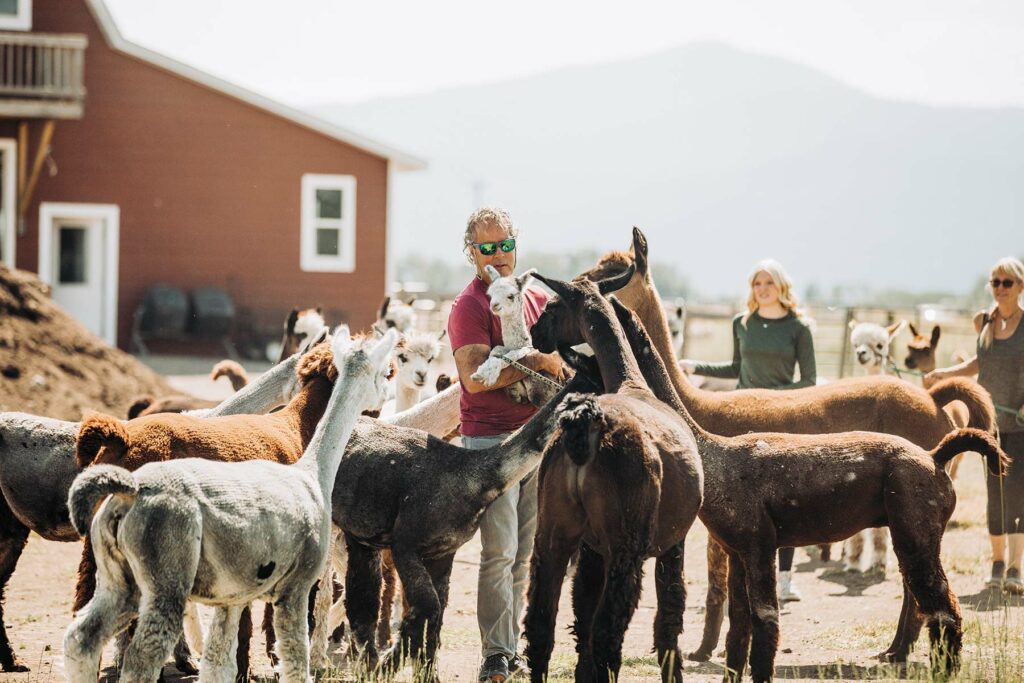
Alpacas of Montana
There’s a strong sense of community in an alpaca herd. “They’re meeting the baby for the first time, so they all have to come out and greet it,” says James Budd, owner and co-founder of Alpacas of Montana, as he cradles a day-old alpaca in his arms. He is surrounded by the animal’s curious herd members.
Alpacas have an interesting history. They were originally domesticated thousands of years ago by Indigenous communities in South America who recognized the animal’s distinct fiber qualities. Alpaca wool is soft, durable, wicking, and hypo-allergenic. In modern times, alpacas have created a stir in the global fiber industry. There are many qualities that make the production of alpaca fiber stand out, but none quite so interesting as the fiber’s protein structure.
Budd was unaware of this history when he started his career in the medical industry. After many intensive years studying medicine and working as an orthopedic surgical physician assistant, he found himself in Montana, open to a new career. Several serendipitous moments led him to alpaca farming, and while he didn’t come from a farming background, he did know a thing or two about biology. When he began researching the industry, he found that while alpaca fiber was historically known to outperform wool in its softness, warmth, and strength, no one really knew why.
Curious, he traveled to Peru and found that no one had gotten to the bottom of alpaca fiber science. He put his biology skills to work and began researching.
Budd found that alpaca fiber is hollow and barbless—a characteristic unique to the species. Because of this, alpaca wool has significant insulating qualities, making it ultra-warm and naturally soft. It doesn’t require chemical washings to smooth out itchy barbs, as does sheep wool. Alpaca fiber does not absorb moisture—it wicks it away—and its lack of lanolin means alpaca is naturally antimicrobial. Aware of these properties, Budd created his own patented line of Alpaca Dry Fusion Technology fabrics, the first government-certified alpaca fabric, which he crafts into socks and hats intended to perform well and be long-lasting.
Budd co-created this business almost 20 years ago with his wife, Sarah. In that time, they have tried brick-and-mortar stores in most major American cities, online sales, and a store on-site at the Bozeman farm. They continue to produce alpaca fiber from their Bozeman property, but to meet demand they rely on a fiber pool composed of roughly 40 small family farms in Peru. Because alpacas have origins in Peru, Budd continues to manufacture his clothing under Peruvian cultural expertise. His technical-wear clothing ranges from socks, hats, and scarves to base layers and polished sweaters and vests—even alpaca-wool-stuffed coats. And his alpaca farm offers daily tours to the public, giving everyone an opportunity to feel the softness of alpaca wool.
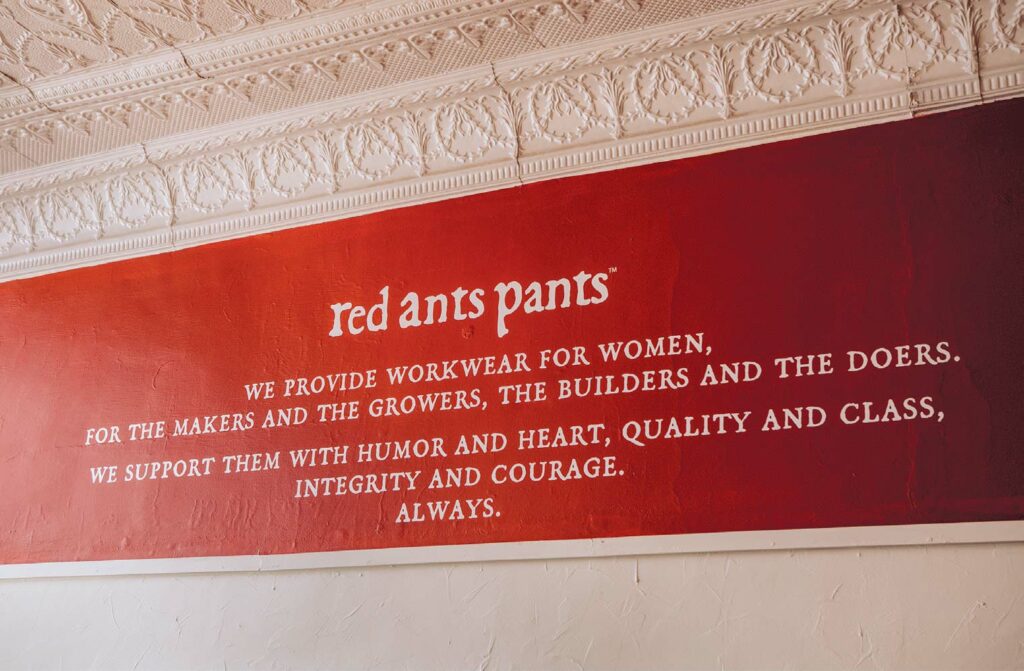
Red Ants Pants
The small Montana town of White Sulphur Springs might not seem a likely home for a thriving clothing designer, but it’s the locale’s rural inspiration that drives Sarah Calhoun to create not only the pants, but the social outreach of her women’s workwear brand: Red Ants Pants. Calhoun grew up on a family farm in Connecticut and has always felt connected to the outdoors. After studying environmental sciences in college and later working as a trail leader for Outward Bound, Calhoun realized women needed good workwear. At that time, there was nothing designed for women on the market, so women workers simply wore men’s pants. She saw this as an opportunity to change the conversation around women in working jobs, creating equity and support not only with the pants they wore, but in how they support each other. She committed to getting women into indestructible pants that actually fit and flatter. And that was just the beginning.
Calhoun, herself, is much like a sewing machine: She weaves a thread that connects people. When she began promoting her clothing line, she toured throughout the United States hosting Tour de Pants Parties. Out of this, a community arose. She found that the pants were just one part of a larger conversation around women’s roles in equity, self-reliance, and rural America. Desiring to grow this conversation, she began a deep dive into ways of fostering community.

Sarah Calhoun found that the pants were just one part of a larger conversation around women’s roles in equity, self-reliance, and rural America. Desiring to grow this conversation, she began a deep dive into ways of fostering community.
“Nothing connects people like music,” she says. And so, the Red Ants Pants Music Festival was born. The mission was to create community through music and generate funding for a foundation that supported women’s leadership, promoted family farms and ranches, and enriched rural community. The festival kicked off in 2011, and Calhoun says it has far exceeded anyone’s expectations.
Today, Calhoun has been able to grow an impactful foundation that influences many Montana women and teens. The Red Ants Pants Foundation provides annual community grants to promote leadership roles for women or in support of agriculture and rural communities. The Girls Leadership Program is an annual year-long mentorship program in which eight high-school juniors attend three weekend retreats, receive one-on-one support from their assigned women mentors, and create a community leadership project. The foundation also hosts workshops that empower and educate women in traditional working skills. Currently, they are offering a series of workshops on timber skills, which includes carpentry and operating chainsaws.
With tremendous amounts of grit and creativity, Calhoun has imagined new ways of fostering community and connection. Putting on the pants was the first step. Doing the work is what has mattered the most.



